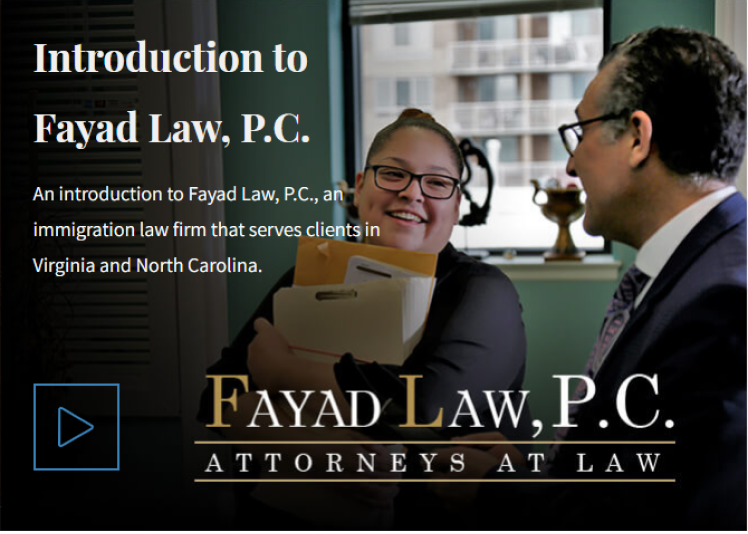Family Immigration
Family based immigrant visas to the US.
Procedure to Apply for Family-Based Immigration
- Your sponsor must submit Form I-130 (Petition for Alien Relative) for you at a USCIS center, along with documentation to prove that:
- He/She is a Citizen or Lawful Permanent Resident of the U.S.
- He/She can support you at 125% above the mandated poverty line and fill out an Affidavit of Support.
- You are related to him/her.
Once USCIS receives your visa petition from your sponsor, it will be approved or denied. In the event that the petition is approved, USCIS will notify your sponsor. If you are outside of the US, USCIS then sends the approved visa petition to the Department of State’s National Visa Center. The Center will notify you when the visa petition is received and again when an immigrant visa number is available. The immigrant visa numbers are chosen on the basis of the Preference Categories (described below). You can check your visa number allotment status in the Department of State’s Visa Bulletin.
If you are already in the U.S. when an immigrant visa number is allotted to you, you can apply to change your status to that of a Lawful Permanent Resident. If you are not in the U.S. when an immigrant visa number becomes available, you must complete the processing of your application at the U.S. Consulate that services the area in which you reside.
Preference Categories
There are several preference categories for allotting of immigrant visa numbers based on the status of the sponsor.
Immediate Allotment: Immediate relatives of U.S. citizens do not have to wait for an immigrant visa number. Once the application is approved by USCIS, they are allotted a number immediately. Immediate relatives include the sponsor’s – parents, spouse and unmarried children below the age of 21 years.
First Preference: Unmarried adult (above the age of 21 years) sons and daughters of U.S. citizens.
Second Preference: Spouses of Lawful Permanent Residents and their unmarried sons and daughters of any age.
Third Preference: Married sons and daughters of U.S. citizens.
Fourth Preference: Brothers and sisters of adult U.S. citizens.
A US Citizen can sponsor:
- His/her spouse
- Unmarried son/daughter of any age
- Married son/daughter of any age
- Parent/Brother/sister provided the sponsor is at least 21 years of age
A Lawful Permanent Resident can sponsor:
- His/her spouse
- Unmarried son/daughter of any age
Introducción A La Ley De Fayad, P.C.

¿tiene Preguntas Sobre Sus Derechos? Listo Para Discutir Tu
Caso De Inmigración? Comuníquese Con Fayad Law, P.C. Ahora.
¿Qué diferencia a Fayad Law, P.C.?

Experiencia De Primera Mano
Como Inmigrantes

Inglés, Árabe, Francés,
Ruso Y Español

Una Trayectoria Probada
De Éxito

Personal, uno a uno
Atencion

Te Mantienes Informado
En Todo Momento

Nos Esforzamos Por El Cliente
Satisfacción
FAQs - Preguntas frecuentes
Hay docenas de diferentes tipos de visas disponibles bajo las disposiciones de la Ley de Inmigración y Nacionalidad (INA), pero todas pueden clasificarse en dos categorías: visas de inmigrante y no inmigrante. La primera es destinada para aquellos que desean establecerse como residentes permanentes y, posiblemente, obtener la naturalización o la ciudadanía. La segunda es para aquellos que planean únicamente visitar los Estados Unidos, por ejemplo, por motivo de negocios o de estudios.
La INA establece los límites de personas que podrán emigrar cada año a los Estados Unidos utilizando ciertos tipos de visas, mientras que otras son ilimitadas. Las visas de inmigración familiar para familiares directos de ciudadanos estadounidenses están disponibles de forma ilimitada, mientras que hay cuotas anuales establecidas para los familiares de residentes permanentes legales y la familia de los ciudadanos, con una cuota máxima de 480,000. El número de visas de inmigración basadas en empleo está limitado a 140,000 por año.
Las vías para obtener la ciudadanía incluyen el servicio militar en los Estados Unidos y la adopción, pero un gran porcentaje de todas las personas que se convierten en ciudadanos lo hacen a través del proceso de naturalización. Los requisitos básicos para la naturalización incluyen:
- Haber vivido en EE.UU como residente permanente durante 5 años (o 3 años para el cónyuge de un ciudadano estadounidense).
- Tener al menos 18 años de edad.
- Vivir dentro del estado en donde realizará la solicitud de ciudadanía por al menos 3 meses antes de la fecha de solicitud.
- Haber estado físicamente presente en el país durante al menos la mitad de los últimos 5 años.
- Ser capaz de leer, escribir y hablar Inglés.
- Tener conocimientos básicos sobre el Gobierno de EE.UU. y educación cívica.
También es necesario comprobar que es una persona de buen carácter moral y de que está apegado a los principios de la Constitución de EE.UU. Podemos ayudarle a comprobar estos factores, así como a preparar su solicitud y a prepararse para sus exámenes.
Clientes Reales, Reseñas Reales
Contacte Con Nosotros Hoy Mismo
¿Tiene preguntas sobre sus derechos? ¿Está listo para tratar su asunto legal? Póngase en contacto con Fayad Law P.C. ahora mismo


















